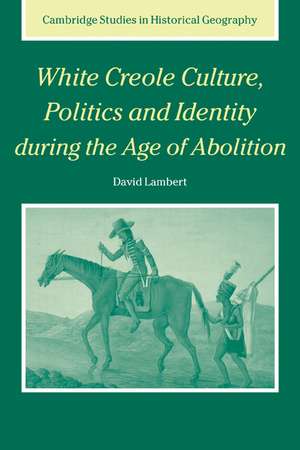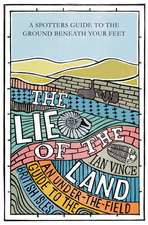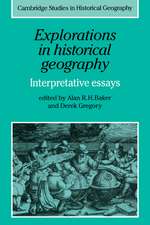White Creole Culture, Politics and Identity during the Age of Abolition: Cambridge Studies in Historical Geography, cartea 38
Autor David Lamberten Limba Engleză Paperback – 15 dec 2010
| Toate formatele și edițiile | Preț | Express |
|---|---|---|
| Paperback (1) | 284.78 lei 6-8 săpt. | |
| Cambridge University Press – 15 dec 2010 | 284.78 lei 6-8 săpt. | |
| Hardback (1) | 725.57 lei 6-8 săpt. | |
| Cambridge University Press – 20 iul 2005 | 725.57 lei 6-8 săpt. |
Din seria Cambridge Studies in Historical Geography
-
 Preț: 273.22 lei
Preț: 273.22 lei -
 Preț: 244.49 lei
Preț: 244.49 lei -
 Preț: 355.39 lei
Preț: 355.39 lei -
 Preț: 338.70 lei
Preț: 338.70 lei -
 Preț: 323.05 lei
Preț: 323.05 lei -
 Preț: 305.12 lei
Preț: 305.12 lei -
 Preț: 286.13 lei
Preț: 286.13 lei -
 Preț: 282.48 lei
Preț: 282.48 lei -
 Preț: 289.19 lei
Preț: 289.19 lei -
 Preț: 407.47 lei
Preț: 407.47 lei -
 Preț: 280.53 lei
Preț: 280.53 lei -
 Preț: 454.76 lei
Preț: 454.76 lei -
 Preț: 340.32 lei
Preț: 340.32 lei -
 Preț: 404.43 lei
Preț: 404.43 lei -
 Preț: 464.60 lei
Preț: 464.60 lei -
 Preț: 436.68 lei
Preț: 436.68 lei -
 Preț: 405.07 lei
Preț: 405.07 lei -
 Preț: 324.15 lei
Preț: 324.15 lei -
 Preț: 317.29 lei
Preț: 317.29 lei -
 Preț: 406.33 lei
Preț: 406.33 lei - 5%
 Preț: 405.43 lei
Preț: 405.43 lei -
 Preț: 288.09 lei
Preț: 288.09 lei -
 Preț: 387.35 lei
Preț: 387.35 lei -
 Preț: 321.52 lei
Preț: 321.52 lei -
 Preț: 189.72 lei
Preț: 189.72 lei -
 Preț: 349.62 lei
Preț: 349.62 lei -
 Preț: 434.01 lei
Preț: 434.01 lei -
 Preț: 316.90 lei
Preț: 316.90 lei -
 Preț: 452.26 lei
Preț: 452.26 lei -
 Preț: 401.28 lei
Preț: 401.28 lei -
 Preț: 338.33 lei
Preț: 338.33 lei
Preț: 284.78 lei
Nou
Puncte Express: 427
Preț estimativ în valută:
54.50€ • 55.81$ • 45.33£
54.50€ • 55.81$ • 45.33£
Carte tipărită la comandă
Livrare economică 18 martie-01 aprilie
Preluare comenzi: 021 569.72.76
Specificații
ISBN-13: 9780521172394
ISBN-10: 052117239X
Pagini: 258
Dimensiuni: 152 x 229 x 15 mm
Greutate: 0.38 kg
Editura: Cambridge University Press
Colecția Cambridge University Press
Seria Cambridge Studies in Historical Geography
Locul publicării:Cambridge, United Kingdom
ISBN-10: 052117239X
Pagini: 258
Dimensiuni: 152 x 229 x 15 mm
Greutate: 0.38 kg
Editura: Cambridge University Press
Colecția Cambridge University Press
Seria Cambridge Studies in Historical Geography
Locul publicării:Cambridge, United Kingdom
Cuprins
List of illustrations; Acknowledgements; Introduction: white creole culture, politics and identity; 1. The geographical 'problem of slavery'; 2. Joshua Steele and the 'improvement' of slavery; 3. Making a 'well constituted Society': the ambitions and limits of white unity; 4. Locating blame for the 1816 Rebellion; 5. Anti-Methodism and the uncertain place of Barbados; 6. 'Days of misery and nights of fear': white ideas of freedom at the end of slavery; Epilogue; Bibliography; Index.
Recenzii
Review of the hardback: 'White Creole Culture is an exemplary cultural history, with its in-depth exploration of individuals and moments, its interdisciplinary range, its utilisation of a range of texts from court cases and poetry to rebel flags and the colonial press, and its eloquent account of the conjunctural formation of white colonial identities across metropole and colony.' Journal of Historical Geography
Review of the hardback: 'Lambert is the first writer since Edward Braithwaite to examine in depth how whites in the Caribbean developed an embryonic white Creole … The major virtue of Lambert's sensitive delineations of white identities is that it will force historians to pay more attention to divisions within the master class and to how whiteness, and by implication blackness, were contested discourses with significant political implications.' English Historical Review
Review of the hardback: '… theoretically stimulating and empirically rich.' H-HistGeog
Review of the hardback: 'Lambert is the first writer since Edward Braithwaite to examine in depth how whites in the Caribbean developed an embryonic white Creole … The major virtue of Lambert's sensitive delineations of white identities is that it will force historians to pay more attention to divisions within the master class and to how whiteness, and by implication blackness, were contested discourses with significant political implications.' English Historical Review
Review of the hardback: '… theoretically stimulating and empirically rich.' H-HistGeog
Descriere
This book explores the articulation of white creole identity in Barbados during the age of abolitionism.









